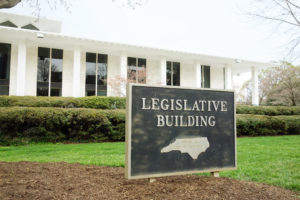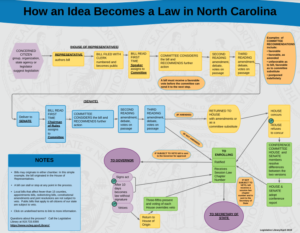
It is going to be busy in Raleigh for the next few months, but how much will come out of it? This is how ideas become laws in NC.
The North Carolina General Assembly has 170 people, working for voters in North Carolina, all with ideas about what should become a state law. While they are what is known as the “long session” they will offer up hundreds and hundreds of ideas and shockingly few will pass. Legislative statistics go back to the 1960s and show a pattern of high numbers of bills introduced and very few enacted. In the 2021-2022 Biennium, only 14 percent of bills introduced were enacted.
A bill, of course, is an idea for legislation that COULD become a law. A resolution is a statement of belief.
Why does this matter? Because it is a long road from the tumultuous first days of a bill to it ever becoming law. In the meantime, social media will dissect it, online and print publications will give it exhaustive coverage, and other media outlets may trot out experts to discuss, refute, or approve of it.
For you it means sit back and wait.
Here is what you should know:
- Most bills pass first reading. That means it has been filed on the floor of the House or Senate
- If it has support it may get a hearing in a legislative committee
- Once it is out of committee it must pass three readings in the House and Senate
- If it gets all three readings the Governor will decide to sign or veto the bill.
- If it is vetoed, it is sent back to the General Assembly which can attempt to overturn the veto or let it become law without his signature.
The state’s legislative library has a chart that explains how this works.

This year will surely be one with much discussion on many important bills. While legislators are sorting things out, remember that you can contact your representative to tell them how you feel on the issues. The North Carolina Medical society has many ways you can advocate.
The current session began January 11 and could end as late as this fall.
